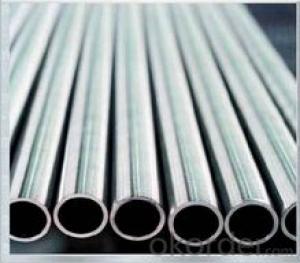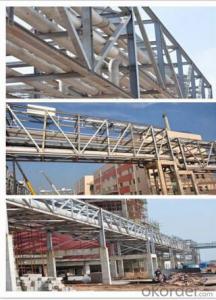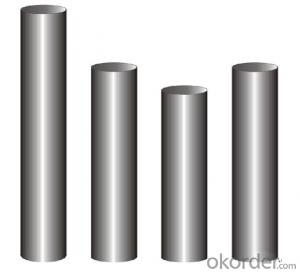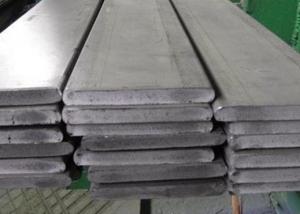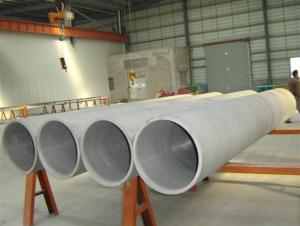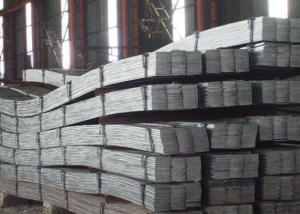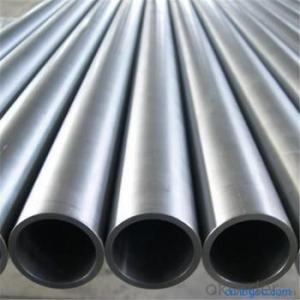STAINLESS STEEL BRIDGE STRUCTURE PIPE
- Loading Port:
- China Main Port
- Payment Terms:
- TT OR LC
- Min Order Qty:
- -
- Supply Capability:
- -
OKorder Service Pledge
Quality Product, Order Online Tracking, Timely Delivery
OKorder Financial Service
Credit Rating, Credit Services, Credit Purchasing
You Might Also Like
Specifications
1. Guaranteed material from established steel factories2. Accordance with International standard
3. Attractive 304 316price
PRODUCT NAME: STAINLESS STEEL BRIDGE STRUCTURE PIPE
| Name | STAINLESS STEEL BRIDGE STRUCTURE PIPE |
| Standard | ASTM, GB, JIS, DIN, EN, AISI |
| Material Grade | TP304 TP304L TP316 TP316L TP347 TP347H TP321 TP321H TP310 TP310S |
| TP410 TP410S TP403 | |
| S31803/S32205 S32750 S32760 | |
| Outer Diameter | Welded Pipe: single slit(Φ8mm-Φ630mm); girth(Φ630mm-Φ3000mm), |
| Thickness | Welded Pipe: single slit(0.5mm-25mm); girth(3mm-30mm) |
| Length | Commonly 5.8 Meters or 6.0 Meters, or as customers' request |
| Tolerance | According to the Standard, +/-10% Commonly. |
| Surface | 180#, 320#, 400# Satin / Hairline, Bright Anneal, Pickle,400#, 500#, 600# or 800# Mirror finish |
| Application | Petrochemical industry, chemical fertilizer industry, oil refining industry, oil and gas industry, light industry and food industry, pulp and paper industry, energy and environmental industries. |
| Test | Flaring test, Flattening test, Bending Test, Hydraulic Test, Eddy Current test |
- Q:What is the difference between 430 and 316 stainless steel pipes?
- The main difference between 430 and 316 stainless steel pipes lies in their composition and properties. 430 stainless steel is a ferritic stainless steel that contains chromium, which gives it good corrosion resistance. However, it is not as resistant to corrosion as 316 stainless steel. It also has lower nickel content compared to 316 stainless steel. On the other hand, 316 stainless steel is an austenitic stainless steel that contains both chromium and nickel. It has excellent corrosion resistance, making it suitable for various applications, including marine environments, where it is exposed to saltwater and other corrosive substances. It also has higher tensile strength and creep resistance compared to 430 stainless steel. In terms of appearance, 430 stainless steel has a dull, brushed finish, while 316 stainless steel has a bright, reflective finish. Considering these differences, the choice between 430 and 316 stainless steel pipes depends on the specific application and the level of corrosion resistance required.
- Q:Can stainless steel pipes be insulated with polystyrene?
- Yes, stainless steel pipes can be insulated with polystyrene. Polystyrene is a commonly used insulation material due to its thermal properties and ability to resist moisture. It can effectively reduce heat transfer and prevent condensation on the surface of the pipe. However, it is important to ensure that the polystyrene insulation is properly sealed and protected to avoid any degradation or damage to the stainless steel pipe.
- Q:What are the different grades of stainless steel used in pipe manufacturing?
- Pipe manufacturing commonly utilizes various grades of stainless steel. These grades are assigned numerical designations, with 304, 316, and 430 being the most prevalent. The most versatile and widely used grade is 304 stainless steel. It boasts a high chromium and nickel content, resulting in exceptional durability and resistance to corrosion. This grade is ideal for applications that involve exposure to corrosive substances or environments, such as chemical processing plants or marine settings. Grade 316 stainless steel shares similarities with grade 304, but it contains a higher level of molybdenum. This additional element significantly enhances its corrosion resistance, particularly against harsh chemicals like chlorides. Grade 316 is often employed in industries like pharmaceuticals, food processing, and coastal areas where saltwater exposure is common. On the other hand, grade 430 stainless steel is considered a more economical choice compared to 304 and 316. It has a lower nickel content and lacks molybdenum. While it still offers favorable corrosion resistance in many environments, it is not as effective against certain corrosive agents as the higher grades. Grade 430 is commonly utilized in applications where cost is the primary consideration, such as for exhaust systems or decorative purposes. Additional grades of stainless steel, such as 201 and 409, may also be utilized in pipe manufacturing depending on specific application requirements. Each grade possesses distinct properties and characteristics, making it crucial to select the appropriate grade based on desired performance, corrosion resistance, and cost considerations.
- Q:What is the typical wall thickness for stainless steel pipes?
- Depending on the application and specific requirements, the wall thickness of stainless steel pipes can vary. Generally, there is a wide range of wall thickness options available for stainless steel pipes. For typical applications like plumbing or industrial use, the wall thickness can range from Schedule 5S (0.049 inches or 1.24 mm) to Schedule 80S (0.218 inches or 5.54 mm). It's worth mentioning that for specialized applications or projects with specific requirements, the wall thickness can be customized accordingly. In summary, factors such as the intended use, pressure requirements, and structural considerations should be taken into account when selecting the appropriate wall thickness for stainless steel pipes.
- Q:Can stainless steel pipes be buried in soil?
- Yes, stainless steel pipes can be buried in soil. Stainless steel is highly resistant to corrosion and can withstand the harsh conditions of being buried underground, making it a suitable choice for various underground applications such as drainage, sewage, and water supply systems.
- Q:Can stainless steel pipes be used for HVAC systems?
- Certainly! HVAC systems can utilize stainless steel pipes. Due to their durability, resistance to corrosion, and high heat tolerance, stainless steel is widely employed in the realm of HVAC applications. These pipes possess the capability to withstand high temperatures and pressures, rendering them suitable for both heating and cooling systems. Moreover, stainless steel pipes are highly resistant to rusting and corrosion, ensuring an extended lifespan and minimal maintenance for HVAC systems. Additionally, the smooth interior surface of stainless steel pipes facilitates improved airflow, ultimately enhancing the efficiency of the HVAC system. In conclusion, when it comes to HVAC installations, stainless steel pipes are an efficient and dependable choice.
- Q:What is the difference between seamless and seamless redrawn stainless steel pipes?
- The main difference between seamless and seamless redrawn stainless steel pipes lies in their manufacturing processes. Seamless stainless steel pipes are produced from solid billets without any seams or welded joints, resulting in a smooth and continuous pipe. On the other hand, seamless redrawn stainless steel pipes are initially produced through the seamless process, but then they undergo additional drawing or resizing processes to achieve more precise dimensions, smoothness, and improved surface finish. Overall, seamless redrawn stainless steel pipes offer enhanced precision and surface quality compared to standard seamless pipes.
- Q:Can stainless steel pipes be used in food processing industries?
- Yes, stainless steel pipes are commonly used in food processing industries. Stainless steel is a highly durable and corrosion-resistant material that is capable of withstanding the harsh environments and high temperatures often found in food processing plants. It is also non-reactive, meaning that it does not interact with the food or alter its taste, making it a safe choice for transporting various food products. Additionally, stainless steel pipes are easy to clean and maintain, ensuring hygiene standards are met in the food processing industry.
- Q:What are the factors to consider when selecting a stainless steel pipe for a specific application?
- When selecting a stainless steel pipe for a specific application, there are several factors to consider. These factors include the required corrosion resistance, temperature and pressure requirements, the type of fluid or gas being transported, the pipe size and thickness, the desired strength and durability, and any specific industry standards or regulations that need to be followed. Additionally, the cost, availability, and ease of installation should also be taken into account. Overall, it is important to carefully evaluate these factors to ensure that the chosen stainless steel pipe is suitable for the intended application.
- Q:Stainless steel welded pipe or seamless pipe expensive?
- Stainless steel is generally divided into three categories: martensitic stainless steel, ferritic stainless steel, austenitic stainless steel, duplex stainless steel and precipitation hardening stainless steel. The price is roughly the same order as stainless steel. But each category has a cheaper and more expensive one, and the difference can be great.
1. Manufacturer Overview |
|
|---|---|
| Location | |
| Year Established | |
| Annual Output Value | |
| Main Markets | |
| Company Certifications | |
2. Manufacturer Certificates |
|
|---|---|
| a) Certification Name | |
| Range | |
| Reference | |
| Validity Period | |
3. Manufacturer Capability |
|
|---|---|
| a)Trade Capacity | |
| Nearest Port | |
| Export Percentage | |
| No.of Employees in Trade Department | |
| Language Spoken: | |
| b)Factory Information | |
| Factory Size: | |
| No. of Production Lines | |
| Contract Manufacturing | |
| Product Price Range | |
Send your message to us
STAINLESS STEEL BRIDGE STRUCTURE PIPE
- Loading Port:
- China Main Port
- Payment Terms:
- TT OR LC
- Min Order Qty:
- -
- Supply Capability:
- -
OKorder Service Pledge
Quality Product, Order Online Tracking, Timely Delivery
OKorder Financial Service
Credit Rating, Credit Services, Credit Purchasing
Similar products
New products
Hot products
Hot Searches
Related keywords
